翻译 12.9
- 格式:ppt
- 大小:231.50 KB
- 文档页数:15

摇滚乐流行乐1 流行乐2 爵士乐0 摇滚乐1 1 西河畔 2 16拍 3 后现代注意0.0摇滚乐2 1.0流行乐1 2.0 8拍1 3.0摇摆乐1 0.1摇滚乐3 1.1流行乐2 2.1 8拍2 3.1摇摆乐2 0.2摇滚乐4 1.2流行乐3 2.2 8拍3 3.2摇摆乐3 0.3摇滚乐5 1.3流行乐4 2.3 8拍4 3.3摇摆乐4 0.4软性摇滚乐 1.4流行乐5 2.4流行乐8 3.4摇摆乐5 0.5慢摇滚乐1 1.5流行乐6 2.5流行乐9 3.5摇摆乐6 0.6慢摇滚乐2 1.6流行乐7 2.6流行乐10 3.6摇摆乐7 0.7冲浪摇滚1 1.7摇摆流行1 2.7架民谣 3.7大型乐队0.8冲浪摇滚2 1.8雷鬼流行 2.8通俗 3.8爵士圆舞曲0.9重摇滚乐 1.9灵魂流行 2.9回旋流行2 3.9拉格泰姆音乐疯克迪斯科古典乐拉丁舞曲4 疯克15 摇摆舞曲6 轮唱曲7 恰恰恰1 4.0疯克2 5.0流行电子乐1 6.0赋格曲7.0恰恰恰2 4.1冷酷 5.1迪斯科 6.1巴洛格7.1恰恰恰3 4.2蓝调音乐 5.2浩室1 6.2钢琴1 7.2伦巴14.3狂热的博普5.3浩室26.3华尔兹17.3伦巴24.4曳步舞曲15.4浩室36.4华尔兹27.4比津4.5曳步舞曲25.5嘻哈16.5华尔兹37.5萨尔萨4.6曳步舞曲35.6嘻哈26.6华尔兹47.6波萨诺伐4.7电布鲁斯5.7流行电子乐26.7钢琴27.7桑巴4.8说唱5.8雷鬼6.8钢琴37.8曼波4.9布鲁拉斯摇滚5.9boogle6.9华尔兹57.9梅伦格其他种类1 其他种类28 阿达尼9 迪克西18.0巴拉迪9.0迪克西28.1 9.1乡村音乐18.2圆蓬9.2乡村音乐28.3哈巴内拉9.3民俗乐8.4 9.4法国香颂8.5探戈1 9.5蓝草音乐8.6探戈2 9.6曳步舞曲48.7波尔卡9.7拉丁摇滚8.8演歌1 9.8重金属8.9演歌2 9.9.民族摇滚钢琴大键琴打击乐器电吉他00.0钢琴1 01 大键琴1 02 电颤琴1 03 失真音1 00.0钢琴2 01.0大键琴2 02.0马巴林1 03.0电子音00.1玩具钢琴01.1大键琴3 02.1钢鼓1 03.1爵士音00.2酒吧钢琴01.2大键琴4 02.2马巴林2 03.2弱音1 00.3钢琴3 01.3大键琴5 02.3电颤琴2 03.3弱音2 00.4钢琴4 01.4大键琴6 02.4八音盒03.4弱音3 00.5钢琴5 01.5大键琴7 02.5木琴03.5回旋音1 00.6钢琴|弦乐01.6大键琴8 02.6钢鼓2 03.6回旋音2 00.7弦钢琴01.7笛音02.7钢片琴03.7摇滚音00.8贝斯|钢琴3 01.8管音02.8风铃03.8流行音00.9贝斯钢琴4 01.9弦音02.9 03.9失真音2 木管乐器风琴贝斯合成簧乐器04萨克斯1 05 管风琴1 06 合成贝斯1 07 合成簧乐1 04.0单簧管1 05.0管风琴2 06.0木贝斯07.0合成簧乐2 04.1双簧管1 05.1管风琴3 06.1电贝斯1 07.1合成簧乐3 04.2萨克斯2 05.2管风琴4 06.2重贝斯1 07.2流行主奏1 04.3巴松管05.3簧风琴06.3合成贝斯2 07.3流行主奏2 04.4单簧管2 05.4教堂风琴06.4电贝斯2 07.4流行主奏3 04.5簧领乐05.5街头风琴06.5重贝斯2 07.5合成主奏1 04.6萨克斯2 05.6管风琴5 06.6合成贝斯3 07.6合成主奏2 04.7双环管2 05.7管风琴6 06.7电贝斯3 07.7合成主奏3 04.8风笛05.8管风琴7 06.8电贝斯4 07.8强主奏1 04.9单簧管3 05.9管风琴8 06.9电贝斯5 07.9强主奏2合成声合奏组08 大教堂09 弦乐108.0太空舞09.0弦乐208.1幻觉1 09.1弦乐308.2幻觉2 09.2弦乐408.3合成声1 09.3合唱108.4合成声2 09.4合唱208.5合成声3 09.5合唱308.6幻觉2 09.6合奏108.7合成体1 09.7合奏208.8合成体2 09.8合奏308.9合成体3 09.9合奏4电钢琴钢片琴风琴打击乐器古典吉他10 电钢琴1 11 趣味钢片琴12 打击乐器1 13 箱式吉他1 10.0电钢琴2 11.0合成钢片琴1 12.0打击乐器2 13.0古典吉他1 10.1电钢琴3 11.1合成钢片琴2 12.1打击乐器3 13.1十二弦吉他1 10.2电钢琴4 11.2合成钢片琴3 12.2打击乐器4 13.2竖琴10.3电钢琴5 11.3手风琴1 12.3打击乐器5 13.3五弦琴10.4电钢琴6 11.4手风琴2 12.4打击乐器6 13.4十三弦古筝10.5笛音11.5竖钢片琴12.5打击乐器7 13.5箱式吉他2 10.6弦音11.6竖吉他12.6打击乐器8 13.6古典吉他2 10.7贝斯|电钢琴1 11.7合成音1 12.7 铃 1 13.7十二弦吉他2 10.8贝斯|电钢琴2 11.8合成音2 12.8 铃 2 13.8箱式吉他3 10.9贝斯|电钢琴3 11.9合成音3 12.9 铃 3 13.9古典吉他3 铜管和弦电风琴分裂长笛14小号15 爵士风琴1 16 贝斯|钢琴1 17 长笛114.0小提琴1 15.0爵士风琴2 16.0贝斯|钢琴2 17.0汽笛14.1大提琴1 15.1爵士风琴3 16.1电钢琴|铜管17.1短笛114.2口琴1 15.2爵士风琴4 16.2贝斯|风琴17.2八孔直笛14.3长号15.3爵士风琴5 16.3贝斯|铜管17.3八孔竖笛14.4法国号15.4摇滚风琴16.4贝斯|vib 17.4卵形笛14.5小提琴2 15.5电风琴1 16.5贝斯|吉他1 17.5长笛214.6口琴2 15.6电风琴2 16.6贝斯|吉他2 17.6短笛214.7短号15.7电风琴3 16.7贝斯|吉他3 17.7长笛314.8低音提琴15.8 16.8贝斯|吉他4 17.8vib|长笛14.9大提琴2 15.9 16.9吉他|合唱17.9唱诗长笛音效合奏18回波闪耀19 管乐118.0昆虫19.0管乐218.1电玩19.1管乐318.2太空19.2管乐418.3摩托车19.3管乐518.4延长音19.4合奏518.5警报19.5合奏618.6车喇叭19.6合奏718.7电话19.7合奏818.8幻觉19.8合奏918.9宴会19.9合奏10。

2.1长期激烈争论的安乐死问题最近已演变为激烈的公众大讨论,正反双方都声称对维护最终的正义负有责任。
2.2因此这些安乐死的支持者用更大的力量宣扬安乐死计划。
2.3在荷兰,癌症病人和多种硬化症的病人是容易成为安乐死的对象人群,2.4去年秋天,19名有威望的英国医生写了封公开信呼吁对晚期的艾滋病人的安乐死合法化。
2.5一些赞成安乐死的狂热行为为他们提供了反击的证据,那些人声称对志愿安乐死合法化会引起安乐死的各种滥用。
2.6即使在荷兰,议会上的议案也只是将安乐死局限在很少的病例上,并且在严格的监管下对这些病例实行安乐死。
3.1除了结婚之外,旅行去新的地方,在路上驾驶,乘坐飞机,签署商业合约甚至是无意中说的话都可能很快的导致最终的悲剧。
3.2对我们很多人来说,赌搏在许多的情况下,是抵制乏味和冷漠的无毒的药,有助于我们保持良好的脾气心态,具有耐心和乐观向上,而这些能给我们带来极大好处。
3.3事实上没有人有权利谴责赌搏因为没有人敢说曾他们从不赌搏,即使是花一点点钱投资在足球彩票上或是摸彩带。
3.4如果一个人迷恋赌搏达到了疯狂的程度,他不仅仅失去多年辛勤工作得来的财富,而且也会失去他的尊严和良3.5就是说如果一个人限制信,财搏作为游戏带来的快乐胜过它作为万恶之源。
3.6我们为了达到能够控制财搏的目标,我们鼓励了如此多的活动的兴趣,以致于财搏本身使去作为鸦片的魅力,变成乏味的、无趣的事物。
4.1无论我们做什么,我们总是与其它人打交道,不管我们愿意不愿意。
我们做什么,即使是单独做,也受其它人的影响。
4.2我们可能会与家人有些摩擦,或是与周围的人有过争吵,我们可能会与同事生气或是得罪老板。
4.3其它人可能会看不起我们,或在公共场合故意地中伤我们,一些人甚至会暗箭伤人或背后打击我们或说我们的坏话。
4.4如果恬巧你与身边的人发生摩擦,你试着努力心平气和的、坦诚不恭的谈心。
4.5你将会陷入麻烦,因为恶有恶报。
4.6如果,相反的,你固执己见,进行反抗,你必定会遭受重大的损失或至少会让你不会欢迎。
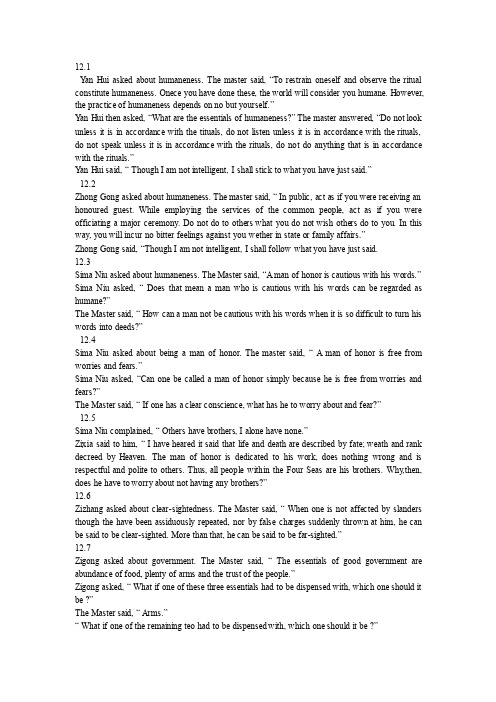
12.1Y an Hui asked about humaneness. The master said, “To restrain oneself and observe the ritual constitute humaneness. Onece you have done these, the world will consider you humane. However, the practice of humaneness depends on no but yourself.”Y an Hui then asked, “What are the essentials of humaneness?” The master answered, “Do not look unless it is in accordance with the tituals, do not listen unless it is in accordance with the rituals, do not speak unless it is in accordance with the rituals, do not do anything that is in accordance with the rituals.”Y an Hui said, “ Though I am not intelligent, I shall stick to what you have just said.”12.2Zhong Gong asked about humaneness. The master said, “ In public, act as if you were receiving an honoured guest. While employing the services of the common people, act as if you were officiating a major ceremony. Do not do to others what you do not wish others do to you. In this way, you will incur no bitter feelings against you wether in state or family affairs.”Zhong Gong said, “Though I am not intelligent, I shall follow what you have just said.12.3Sima Niu asked about humaneness. The Master said, “A man of honor is cautious with his words.”Sima Niu asked, “Does that mean a man who is cautious with his words can be regarded as humane?”The Master said, “ How can a man not be cautious with his words when it is so difficult to turn his words into deeds?”12.4Sima Niu asked about being a man of honor. The master said, “A man of honor is free from worries and fears.”Sima Niu asked, “Can one be called a man of honor simply because he is free from worries and fears?”The Master said, “ If one has a clear conscience, what has he to worry about and fear?”12.5Sima Niu complained, “ Others have brothers, I alone have none.”Zixia said to him, “ I have heared it said that life and death are described by fate; weath and rank decreed by Heaven. The man of honor is dedicated to his work, does nothing wrong and is respectful and polite to others. Thus, all people within the Four Seas are his brothers. Why,then, does he have to worry about not having any brothers?”12.6Zizhang asked about clear-sightedness. The Master said, “ When one is not affected by slanders though the have been assiduously repeated, nor by false charges suddenly thrown at him, he can be said to be clear-sighted. More than that, he can be said to be far-sighted.”12.7Zigong asked about government. The Master said, “The essentials of good government are abundance of food, plenty of arms and the trust of the people.”Zigong asked, “ What if one of these three essentials had to be dispensed with, which one should it be ?”The Master said, “ Arms.”“ What if one of the remaining teo had to be dispensed with, which one should it be ?”“ Food,” said the Master. “ After all, since the beginning if time, no one has been able to escape the fate of death. But without the trust of the common people, the government would have nothing to sustain itself.”12.8Ji Zicheng siad, “ The important thing about a man of honor is his good intrinsic quality. (When he has good intrinsic quality,) what need is there for cultural refinement?”Zigong said, “ What a pity that you should talk about a man of honor in such a way. A word once spoken cannot be overtaken even by a team of four horses. ( To a man of honor,) cultural refinement is just as important as his intrinsic quality. The skin of a tiger or leopard would be no defferent from that of a dog or sheep once its colorful fur is shorn.”12.9Duke Ai(of Lu) asked Y ouruo, “We have had a poor harvest and I have not enough to cover my expenditures. What should I do ?”Y ouruo answered, “ Why not introduce a tithe?” The duke said, “ I don‟t have enough to spend even if I double the rate, how could a tithe do?”To which Y ouruo replied, “ When the people have plenty, the sovereign will not be in want; when the people are in want, how can the sovereign have plenty?”12.10Zizhang asked how one could cultivate virtue and the ability to resolve doubts at times of confusion. The master said, “ Make it your guiding principle to be loyal and trustworthy and keep to the path of righteousness and you will be cultivating virtue. When you love a person, you want him to have a long life, but when you hete him, you want him to die. When you want him both to live and to die, that is confusion. … If you did not love her for her riches, you must have forsaken her, for you have changed your mind‟.”12.11Duke Jing (of Qi) asked Confucius about government. Confucius replied, “ Let the sovereign be a sovereign, the subject a subject, the father a fether, the son a son.”The Duke remarked, “ Well said. If the sovereign did not act like a sovereign, the subject not like a subject, the father not like a father and the son not like a son, then even if there were plenty of grain, would I get my share?”12.12The Master said, “If there‟s anyone who can settle a litigation case on the basis of evidence provided by one party, Zilu is probably the one.”Zilu never puts off fulfilling his promise.12.13The Master said, “ In settling a lawsuit, I am little different from others. I feel it is best to do away with all lawsuits.”12.14Zizhang asked about government. The Master said, “Never slacken your efforts at your post, show your loyalty when carrying out government orders.”12.15The Master said, “ The humane will not go astray for he is widely read and he keeps himself in line with the rituals.”12.16The Master said, “A man of honor helps others to realize their best aims, but not their worst desires. A petty-minded man does the opposite.”12.17Ji Kangzi asked Confucius about government. Confucius said, “ The world zheng is a homonym of the word zheng. If you set an example by being upright, who would dare to be otherwise?”12.18Ji Kangzi was disturbed by the large number of thieves. He asked Confucius for advice. Confucius said, “ If you were not covetous, no one would commit burglary even if they were to be rewarded for doing so.”12.19Ji Kangzi asked Confucius about government , “ What do you think of killing those who do not follow the Way so as to move the people closer to those who follow the the Way ?”Confucius answered , “ In governing a state, what need is there for you to kill? If you govern the state well , the common people will naturally become good. The morality of the man of honor is like the wind. That of the petty man is like grass. When there is a wind, the grass is sure to bend in the direction the wind blows.”12.20Zizhang asked, “ What must a scholar do to become prestigious?”The Master asked him, “ What is your understanding of being prestigious?”Zizhang answered, “ To be well-known whether serving the state or the big family.”“ But that is only being well-known and not prestigious. To win prestige, one must be upright and just sensitive to other‟s words and observant of their moods and expressions, and always ready to give precedence to others. Such a person is sure to win prestige whether he serves the state or a big family. A well-known person may put on an appearance of being honorable, but acts to the contrary, and feels no qualms about it. Such a person can make himself well-known whatever he does, in or out of government.12.21Fan Chi accompanied Confucius on an outing to the Rain Altar. He said, “May I ask how one can cultivate virtue, clear up resentment against oneself and recognize foolishness?”The Master answered, “What an excellent question! Isn‟t a person cultivating virtue when he places service before reward? Isn‟t he clearing up resentment when he criticizes his own mistakes rather than those of others? Isn‟t it foolishness when, in a sudden fit of anger, one neglects his own safety and even that of his parents?”12.22Fan Chi asked about humaneness. The Master said, “Know your fellow men.”He asked about wisdom. The Master said, “Know your fellow men。

历年英语翻译资格考试中级笔译英译汉真题(网友版)Passage 1Farms go out of business for many reasons, but few farms do merely because the soil has failed. That is the miracle of farming. If you care for the soil, it will last — and yield — nearly forever. America is such a young country that we have barely tested that. For most of our history, there has been new land to farm, and we still farm as though there always will be.Still, there are some very old farms out there. The oldest is the Tuttle farm, near Dover, N.H., which is also one of the oldest business enterprises in America. It made the news last week because its owner — a lineal descendant of John Tuttle, the original settler — has decided to go out of business. It was founded in 1632. I hear its sweet corn is legendary.The year 1632 is unimaginably distant. In 1632, Galileo was still publishing, and John Locke was born. There were perhaps 10,000 colonists in all of America, only a few hundred of them in New Hampshire. The Tuttle acres, then, would have seemed almost as surrounded as they do in 2010, but by forest instead of highways and houses.It was a precarious operation at the start —as all farming was in the new colonies—and it became precarious enough again in these past few years to peter out at last. The land is protected by a conservation easement so it can’t be developed, but no one knows whether the next owner will farm it.In a letter on their Web site, the Tuttles cite “exhaustion of resources” as the reason to sell the farm. The exhausted resources they list include bodies, minds, hearts, imagination, equipment, machinery and finances. They do not mention soil, which has been renewed and redeemed repeatedly. It’s as though the parishioners of the FirstParish Church in nearby Dover —erected nearly 200 years later, in 1829 —had rebuilt the structure on the same spot every few years.It is too simple to say, as the Tuttles have, that the recession killed a farm that had survived for nearly 400 years. What killed it was the economic structure of food production. Each year it has become harder for family farms to compete with industrial scale agriculture —heavily subsidized by the government —underselling them at every turn. In a system committed to the health of farms and their integration with local communities, the result would have been different. In 1632, and for many years after, the Tuttle farm was a necessity. In 2010, it is suddenly superfluous, or so we like to pretend.出处:尽管导致农民破产的原因有很多,但很少农民仅仅是因为土地失去肥力而破产,这可以算是一个农业奇迹。
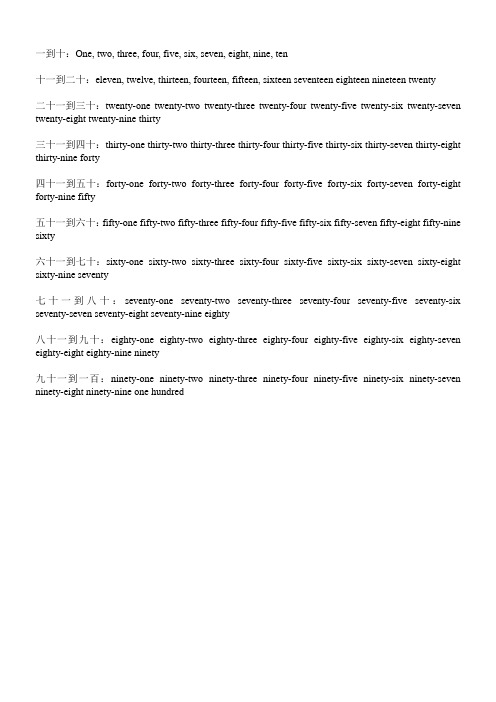
一到十:One, two, three, four, five, six, seven, eight, nine, ten十一到二十:eleven, twelve, thirteen, fourteen, fifteen, sixteen seventeen eighteen nineteen twenty二十一到三十:twenty-one twenty-two twenty-three twenty-four twenty-five twenty-six twenty-seven twenty-eight twenty-nine thirty三十一到四十:thirty-one thirty-two thirty-three thirty-four thirty-five thirty-six thirty-seven thirty-eight thirty-nine forty四十一到五十:forty-one forty-two forty-three forty-four forty-five forty-six forty-seven forty-eight forty-nine fifty五十一到六十:fifty-one fifty-two fifty-three fifty-four fifty-five fifty-six fifty-seven fifty-eight fifty-nine sixty六十一到七十:sixty-one sixty-two sixty-three sixty-four sixty-five sixty-six sixty-seven sixty-eight sixty-nine seventy七十一到八十:seventy-one seventy-two seventy-three seventy-four seventy-five seventy-six seventy-seven seventy-eight seventy-nine eighty八十一到九十:eighty-one eighty-two eighty-three eighty-four eighty-five eighty-six eighty-seven eighty-eight eighty-nine ninety九十一到一百:ninety-one ninety-two ninety-three ninety-four ninety-five ninety-six ninety-seven ninety-eight ninety-nine one hundred1 one2 two3 three4 four5 five6 six7 seven8 eight9 nine 10 ten11 eleven 12 twelve 13 thirteen 14 fourteen 15 fifteen 16 sixteen 17 seventeen 18eighteen 19nineteen 20twenty 21twenty-one 22twenty-two 23twenty-three 24twenty-four 25twenty-five 26 twenty-six 27twenty-seven 28twenty-eight 29twenty-nine 30thirty 31thirty-one 32thirty-two 33thirty-three 34thirty-four 35thirty-five 36thirty-six 37thirty-seven 38thirty-eight 39thirty-nine 40forty 41forty-one 42forty-two 43forty-three 44forty-four 45forty-five 46forty-six 47forty-seven 48forty-eight 49forty-nine 50fifty 51fifty-one 52fifty-two 53fifty-three 54fifty-four 55fifty-five 56fifty-six 57fifty-seven 58fifty-eight 59fifty-nine 60sixty 61sixty-one 62sixty-two 63sixty-three 64sixty-four 65sixty-five 66sixty-six 67sixty-seven 68sixty-eight 69sixty-nine 70seventy 71seventy-one 72seventy-two 73seventy-three 74seventy-four 75seventy-five 76seventy-six 77seventy-seven 78seventy-eight 79seventy-nine 80eighty 81eighty-one 82eighty-two 83eighty-three 84eighty-four 85eighty-five 86eighty-six 87eighty-seven 88eighty-eight 89eighty-nine 90ninety 91ninety-one 92ninety-two 92ninety-three 94ninety-four 95ninety-five 96ninety-six 97ninety-seven 98ninety-eight 99ninety-nine 100 one hundred101 one hundred and one 102 one hundred and two 103 one hundred and three 200 two hundred 300 three hundred 400 four hundred 500 five hundred600 six hundred 700 seven hundred 800 eight hundred 900 nine hundred一千one thousand 2000 two thousand 3000 three thousand 4000 four thousand 一万=十个一千ten thousand zero 零。
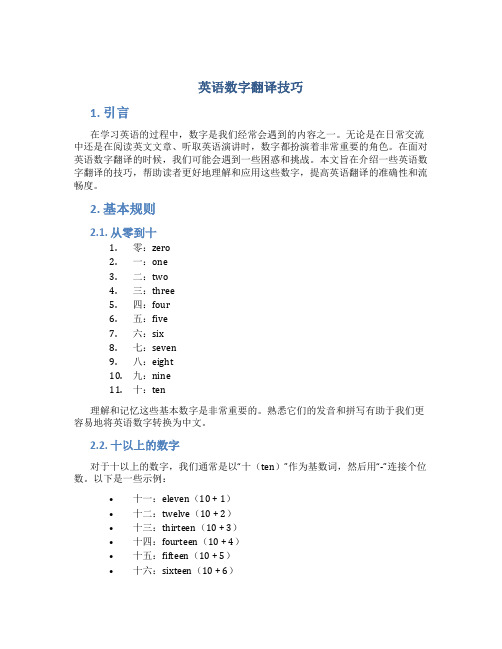
英语数字翻译技巧1. 引言在学习英语的过程中,数字是我们经常会遇到的内容之一。
无论是在日常交流中还是在阅读英文文章、听取英语演讲时,数字都扮演着非常重要的角色。
在面对英语数字翻译的时候,我们可能会遇到一些困惑和挑战。
本文旨在介绍一些英语数字翻译的技巧,帮助读者更好地理解和应用这些数字,提高英语翻译的准确性和流畅度。
2. 基本规则2.1. 从零到十1.零:zero2.一:one3.二:two4.三:three5.四:four6.五:five7.六:six8.七:seven9.八:eight10.九:nine11.十:ten理解和记忆这些基本数字是非常重要的。
熟悉它们的发音和拼写有助于我们更容易地将英语数字转换为中文。
2.2. 十以上的数字对于十以上的数字,我们通常是以“十(ten)”作为基数词,然后用“-”连接个位数。
以下是一些示例:•十一:eleven(10 + 1)•十二:twelve(10 + 2)•十三:thirteen(10 + 3)•十四:fourteen(10 + 4)•十五:fifteen(10 + 5)•十六:sixteen(10 + 6)•十七:seventeen(10 + 7)•十八:eighteen(10 + 8)•十九:nineteen(10 + 9)2.3. 十的倍数对于十的倍数,我们可以使用以下规则进行翻译:•二十:twenty•三十:thirty•四十:forty•五十:fifty•六十:sixty•七十:seventy•八十:eighty•九十:ninety值得注意的是,如果数字的个位数是零,我们通常不说出该数字,例如:•二十一:twenty-one•三十五:thirty-five•六十八:sixty-eight2.4. 百、千和万在英语中,百、千和万的表示方式有些特殊。
以下是例子:•一百:one hundred•两百:two hundred•三百:three hundred•一千:one thousand•两千:two thousand•一万:ten thousand对于其他数字,我们使用百位、千位等类似的表达形式。
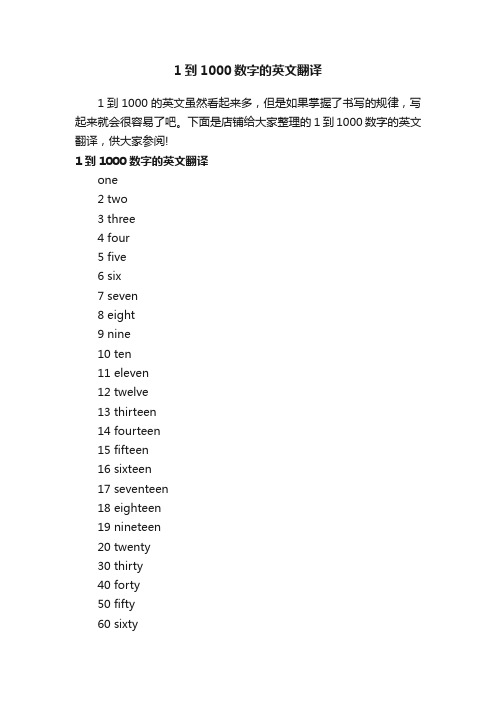
1到1000数字的英文翻译1到1000的英文虽然看起来多,但是如果掌握了书写的规律,写起来就会很容易了吧。
下面是店铺给大家整理的1到1000数字的英文翻译,供大家参阅!1到1000数字的英文翻译one2 two3 three4 four5 five6 six7 seven8 eight9 nine10 ten11 eleven12 twelve13 thirteen14 fourteen15 fifteen16 sixteen17 seventeen18 eighteen19 nineteen20 twenty30 thirty40 forty50 fifty60 sixty70 seventy80 eighty90 ninty100 hundred1000 thousand1,000,000 million1,000,000,000 billion1,000,000,000,000 thillion英语数字表达法:英语基数词英语中数词主要分为基数词和序数词两类。
基数词简介口诀 1至12逐个记,13至19teen结尾 20至90整十数,ty结尾是后缀要是表示几十几,连字符十位连个位若要表示几百几,hundred之后and立基数词:表示数目的词称为基数词。
其形式如下:(1).从1——10 one,two,three,four,five,six,seven,eight,nine,ten.(2).从11——19 eleven,twelve,thirteen,fourteen,fifteen, sixteen, seventeen,eighteen, nineteen.这里除 eleven, twelve, thirteen, fifteen, eighteen为特殊形式外,fourteen,sixteen,seventeen,nineteen都是由其个位数形式后添加后缀-teen构成。
(3).从20——99 整数几十中除twenty,thirty, forty,fifty,eighty为特殊形式外,sixty,seventy,ninety都是其个位数形式后添加后缀-ty构成。

六年级论语(下)摘选六年级第一学期期中考试背诵内容(五)先进篇第十一【11.4】子曰:“回也非助我者也,于吾言无所不说(通“悦”)。
”翻译:孔子说:“颜回不是对我有所助益的人,他对我说的话没有不喜欢的。
”解读:孔子对颜回能又快又深领悟自己的学说表示了深深的赞许,但也有一定的遗憾。
颜回聪敏秀慧,对孔子的言语一听就能领会,故只喜悦于心,而无所疑问。
既然没有疑问,孔子便不再发挥,而在座的其他弟子不能有所获益,故孔子有一定的遗憾,但又对颜回的好学深思表示赞许。
【11.7】季康子问:“弟子孰为好学?”子曰:“有颜回者好学,不幸短命死矣!今也则亡(通“无”)。
”翻译:鲁哀公问(孔子):“(你的)学生中谁是最好学的?”孔子回答说:“有个叫颜回的最好学,不幸年纪轻轻死了,现在没有(像颜回那样好学的人)了。
”【11.9】颜渊死,子曰:“噫!天丧予!天丧予!”翻译:颜渊死了,孔子道:“咳!天老爷要我的命呀!天老爷要我的命呀!”【11.15】门人不敬子路。
子曰:“由也升堂矣,未入于室也。
”翻译:孔子的学生们不尊敬子路。
孔子便说:“仲由嘛,他在学习上已经达到升堂的程度了,只是还没有入室罢了。
”(让弟子们不能不尊敬子路,点拨其它的门人,批评他们不敬子路是错误的。
)【11.16】子曰:“过犹不及。
”翻译:事情做得过头,就跟做得不够一样,都是不合适的。
【11.20】子张问善人之道,子曰:“不践迹,亦不入于室。
”翻译:子张问怎样才是善人。
孔子道:“善人不踩着别人的脚印走,学问道德也难以到家。
”(任何人若想学问道德有所成,都必须刻苦学习、勤于实践,以此勉励子张,莫要心存侥幸,应做好扎扎实实的基础工夫。
)【11.21】子曰:“论笃是与,君子者乎?色庄者乎?”翻译:孔子说:“要赞许说话稳重的人,但这种人是真正的君子呢,还是仅仅从容貌上看起来庄重呢?”【11.22】子曰:“求也退,故进之;由也兼人,故退之。
”翻译:孔子说:“冉求总是退缩,所以我鼓励他;仲由好勇过人,所以我约束他。


数字翻译英语数字翻译英语是一个用英语表达数字的基本技巧。
数字在日常生活和工作中是不可避免的,因此掌握数字翻译英语的方法非常重要。
下面是一些常用的数字翻译方法和例子:1. 基本数字(0-9):0 - zero1 - one2 - two3 - three4 - four5 - five6 - six7 - seven8 - eight9 - nine2. 十位数字(10-90):10 - ten20 - twenty30 - thirty40 - forty50 - fifty60 - sixty70 - seventy80 - eighty90 - ninety3. 大于十的数字(11-19):11 - eleven12 - twelve13 - thirteen14 - fourteen15 - fifteen16 - sixteen17 - seventeen18 - eighteen19 - nineteen4. 大于二位数的数字: 21 - twenty-one54 - fifty-four87 - eighty-seven99 - ninety-nine5. 百位数字:100 - one hundred200 - two hundred 300 - three hundred 400 - four hundred 500 - five hundred 600 - six hundred700 - seven hundred ...900 - nine hundred6. 千位数字:1000 - one thousand 2000 - two thousand3000 - three thousand...7000 - seven thousand...10000 - ten thousand...1000000 - one million7. 万位以上的数字:20000 - twenty thousand500000 - five hundred thousand1000000 - one million1000000000 - one billion8. 小数:0.5 - zero point five2.75 - two point seven five3.14 - three point one four这里提供的是一些基本的数字翻译方法和示例,希望能对你有所帮助。

口译基础----数字译法一,口译中经常遇到数字,没有经过训练的人往往会出错,这是因为汉语和英语数字表达的方式不同。
汉语是个,十,百,千,万,十万,百万,千万,亿,十亿……,也就是以“十”的倍数来表示;而英语则是在数字超过千以后,以“千”(thousand)的倍数来表达的。
如“一万”是“十千”,即ten shousand;“十万”是“百千”,即hundred thousand,直至“百万”,million。
百万以上的数字则用“百万”的倍数表达;如“千万”是“十百万”,即ten million;“亿”是“百百万”,即hundred million,直至“十亿”,billion。
掌握以上情况后就知道,凡遇到“万”和“十万”时都要变成“十千”,“百千”。
当然,如记录时能把上述数字立即写成10,000和100,000,翻译起来就容易了。
如记录时写成3万,30万,那就要在口译时迅速地转换成“三十千”,“三百千”后再翻译。
因此如何记下数字也是一个问题。
上百万的数字最简单的表达方法是把百万以后的数字用point多少来表达,如396万可说成3.96 million;3亿9,650万是396.5 million;以此类推,10亿以上的数字“百亿”是“十十亿”;129亿就是12.9 billion。
在用小数点时应注意:小数点以前的数字读法同基数词,即数字之间一般不用连接词,只在hundred和后面的十位数之间用and,如123,456读作one hundred and twenty-three thousandfour hundred and fifty-six。
但小数点的数字要一个个分开来读,如3.126读作three point onetwo six。
二,翻译时常会遇到一些较笼统的数字,如“几个”,“十几个”,“几十个”等等,这类表达法需要熟记:几个 some; a few; several; a number of十几个 more than; no more than twenty几个个 dozens of几十年 decades七十好几了 well over seventy好几百个 hundreds of成千上万 thousands of几十万 hundreds of thousands of亿万 hundreds of millions of590 913 2,076 8,565 77,519 3,540,000 三百五十四万5,987,300 五百九十八万七千三 7,620,769 七百六十二万零七百六十九288,202,570 二亿八千八百二十万二千五百七十9,045,781,038 九十亿四千五百七十八万一千零三十八8,935,501,490,326 八万九千三百五十五亿一百四十九万零三百二十六三,汉语中有些对序数词提问的问题,译成英语时要改变提问法,如:1.这是你第几次来中国?Is this your first visit to china?2.你们队得了第几名?Did your team win the championship?3.这孩子是你的老几啊?Is this your oldest/youngest child/son/daughter?四、倍数的翻法(倍数增加)英语中表示倍数增加,常包括基数在内,而汉语不包括基数,这就可能影响理解和翻译。

数字翻译第一部分汉语中每位数字都有单独的数位名称,即; 十、百、千、万、十万、百万、千万、亿、十亿等,也就是以十的倍数来表示。
而英语中只有个、十、百、千thousand、百万million, 十亿billion ,万亿trillion的数位名称,即:在数位超过千以后,以千的倍数来表达。
如一万是ten thousand, 十万是hundred thousand, 直至百万(million ),百万以上的数字则用百万的倍数来表达,如千万是ten million ,亿是hundred million 直至十亿(billion)。
每个数位的大小均以3位数表示,如:2,002, 867,400,000数字中的分节号“,”对掌握这种对应关系有很大帮助,每个“,”的左面恰好是英语数字的一个数位名称,thousand, million, billion,trillion 在汉语中对应的是:千、百万、十亿, 万亿。
2,391,234,567, 890英汉之间的数字转换有下面的规则:1万——ten thousand10万——one hundred thousand100万——one million1000万——10 million1亿——one hundred million10亿——one billion口译时如何记录数字是很关键的。
记录因人而异,可以写成3万,30万,但是口译时要迅速转换成30千,300千。
迅速、准确的记录听到的数字是做好数字口译的第一步。
可以用字母t, m, b, tr 分别表示thousand, million , billion, trillion 等段位。
如果听到汉语1亿2千3百45万6千时可以记录成1亿2345万6千或者:1 乙2345万6 t百万以上的数字最简单的表达方法是把百万以后的数字用point多少来表示,如396万可以说成3.96 million, 3亿9650万是396.5 million。

口译中关于数字译法的几点注意口译中关于数字译法的几点注意口译中关于数字译法的几点注意数字的译法有以下几点注意:一. 口译中经常遇到数字,没有经过训练的人往往会出错,这是因为汉语和英语数字表达的方式不同。
汉语是个,十,百,千,万,十万,百万,千万,亿,十亿,也就是以十的倍数来表示;而英语则是在数字超过千以后,以千(thousand)的倍数来表达的。
如一万是十千,即ten shousand;十万是百千,即hundred thousand,直至百万,million。
百万以上的数字则用百万的倍数表达;如千万是十百万,即ten million; 亿是百百万,即hundred million,直至十亿,billion。
掌握以上情况后就知道,凡遇到万和十万时都要变成十千,百千。
当然,如记录时能把上述数字立即写成10,000和100,000,翻译起来就容易了。
如记录时写成3万,30万,那就要在口译时迅速地转换成三十千,三百千后再翻译。
因此如何记下数字也是一个问题。
上百万的数字最简单的表达方法是把百万以后的数字用point 多少来表达,如396万可说成3.96 million;3亿9,650万是396.5million;以此类推,10亿以上的数字百亿是十十亿;129亿就是12.9 billion。
在用小数点时应注意:小数点以前的数字读法同基数词,即数字之间一般不用连接词,只在hundred和后面的十位数之间用and,如123,456读作one hundred and twenty-three thousand four hundred and fifty-six。
但小数点的数字要一个个分开来读,如3.126读作three point one two six。
二. 翻译时常会遇到一些较笼统的数字,如几个,十几个,几十个等等,这类表达法需要熟记:几个some; a few; several; a number of十几个more than; no more than twenty几个个dozens of几十年decades七十好几了well over seventy好几百个hundreds of成千上万thousands of几十万hundreds of thousands of亿万hundreds of millions of 三. 汉语中有些对序数词提问的问题,译成英语时要改变提问法,如:1.这是你第几次来中国?is this your first visit to china?2.你们队得了第几名?did your team win the championship?3.这是你第几个孩子啊?is this your oldest/youngest child/son/daughter?口译中关于数字译法的几点注意相关内容:。

六年级论语(下)摘选六年级第一学期期中考试背诵内容(五)先进篇第十一【11.4】子曰:“回也非助我者也,于吾言无所不说(通“悦”)。
”翻译:孔子说:“颜回不是对我有所助益的人,他对我说的话没有不喜欢的。
”解读:孔子对颜回能又快又深领悟自己的学说表示了深深的赞许,但也有一定的遗憾。
颜回聪敏秀慧,对孔子的言语一听就能领会,故只喜悦于心,而无所疑问。
既然没有疑问,孔子便不再发挥,而在座的其他弟子不能有所获益,故孔子有一定的遗憾,但又对颜回的好学深思表示赞许。
【11.7】季康子问:“弟子孰为好学?”子曰:“有颜回者好学,不幸短命死矣!今也则亡(通“无”)。
”翻译:鲁哀公问(孔子):“(你的)学生中谁是最好学的?”孔子回答说:“有个叫颜回的最好学,不幸年纪轻轻死了,现在没有(像颜回那样好学的人)了。
”【11.9】颜渊死,子曰:“噫!天丧予!天丧予!”翻译:颜渊死了,孔子道:“咳!天老爷要我的命呀!天老爷要我的命呀!”【11.15】门人不敬子路。
子曰:“由也升堂矣,未入于室也。
”翻译:孔子的学生们不尊敬子路。
孔子便说:“仲由嘛,他在学习上已经达到升堂的程度了,只是还没有入室罢了。
”(让弟子们不能不尊敬子路,点拨其它的门人,批评他们不敬子路是错误的。
)【11.16】子曰:“过犹不及。
”翻译:事情做得过头,就跟做得不够一样,都是不合适的。
【11.20】子张问善人之道,子曰:“不践迹,亦不入于室。
”翻译:子张问怎样才是善人。
孔子道:“善人不踩着别人的脚印走,学问道德也难以到家。
”(任何人若想学问道德有所成,都必须刻苦学习、勤于实践,以此勉励子张,莫要心存侥幸,应做好扎扎实实的基础工夫。
)【11.21】子曰:“论笃是与,君子者乎?色庄者乎?”翻译:孔子说:“要赞许说话稳重的人,但这种人是真正的君子呢,还是仅仅从容貌上看起来庄重呢?”【11.22】子曰:“求也退,故进之;由也兼人,故退之。
”翻译:孔子说:“冉求总是退缩,所以我鼓励他;仲由好勇过人,所以我约束他。


数字的翻译(一)上百万的数字最简单的表达方法是把百万以后的数字用point多少来表达,如396万可说成3.96 million;3亿9,650万是396.5 million;以此类推,10亿以上的数字“百亿”是“十十亿”;129亿就是12.9 billion。
在用小数点时应注意:小数点以前的数字读法同基数词,即数字之间一般不用连接词,只在hundred和后面的十位数之间用and,如123,456读作one hundred and twenty-three thousand four hundred and fifty-six。
但小数点的数字要一个个分开来读,如3.126读作three point one two six。
二,翻译时常会遇到一些较笼统的数字,如“几个”,“十几个”,“几十个”等等,这类表达法需要熟记:几个 some; a few; several; a number of 十几个 more than; no more than twenty几十个 dozens of 几十年 decades 七十好几了 well over seventy好几百个 hundreds of 成千上万 thousands of 几十万 hundreds of thousands of亿万 hundreds of millions of三,汉语中有些对序数词提问的问题,译成英语时要改变提问法,如:1.这是你第几次来中国? Is this your first visit to china?2.你们队得了第几名?Did your team win the championship?3.这孩子是你的老几啊? Is this your oldest/youngest child/son/daughter?英语倍数句型及翻译英语表示倍数增减或倍数对比的句型多种多样,其中有一些很容易译错——其主要原因在于:英汉两语在表述或对比倍数方面存在着语言与思维差异。
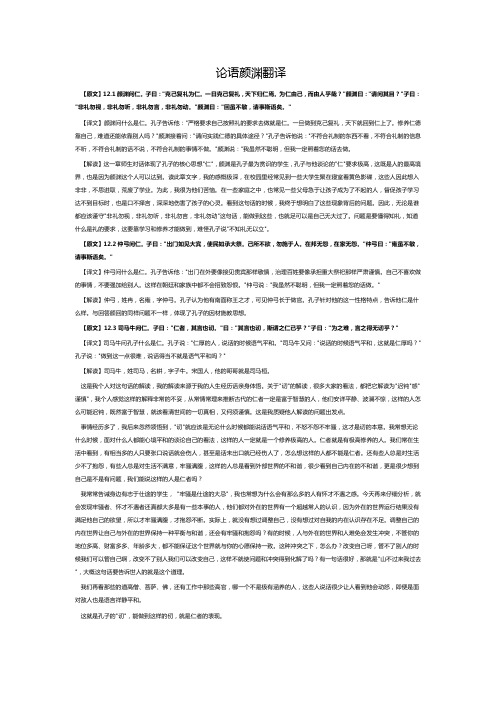
论语颜渊翻译【原文】12.1颜渊问仁。
子曰:"克己复礼为仁。
一日克己复礼,天下归仁焉。
为仁由己,而由人乎哉?"颜渊曰:"请问其目?"子曰:"非礼勿视,非礼勿听,非礼勿言,非礼勿动。
"颜渊曰:"回虽不敏,请事斯语矣。
"【译文】颜渊问什么是仁。
孔子告诉他:"严格要求自己按照礼的要求去做就是仁。
一旦做到克己复礼,天下就回到仁上了。
修养仁德靠自己,难道还能依靠别人吗?"颜渊接着问:"请问实践仁德的具体途径?"孔子告诉他说:"不符合礼制的东西不看,不符合礼制的信息不听,不符合礼制的话不说,不符合礼制的事情不做。
"颜渊说:"我虽然不聪明,但我一定照着您的话去做。
【解读】这一章师生对话体现了孔子的核心思想"仁",颜渊是孔子最为赏识的学生,孔子与他谈论的"仁"要求极高,这既是人的最高境界,也是因为颜渊这个人可以达到。
读此章文字,我的感慨极深,在校园里经常见到一些大学生聚在寝室看黄色影碟,这些人因此想入非非,不思进取,荒废了学业。
为此,我很为他们苦恼。
在一些家庭之中,也常见一些父母急于让孩子成为了不起的人,督促孩子学习达不到目标时,也是口不择言,深深地伤害了孩子的心灵。
看到这句话的时候,我终于想明白了这些现象背后的问题。
因此,无论是谁都应该谨守"非礼勿视,非礼勿听,非礼勿言,非礼勿动"这句话,能做到这些,也就足可以是自己无大过了。
问题是要懂得知礼,知道什么是礼的要求,这要靠学习和修养才能做到,难怪孔子说"不知礼无以立"。
【原文】12.2仲弓问仁。
子曰:"出门如见大宾,使民如承大祭。
己所不欲,勿施于人。
在邦无怨,在家无怨。
"仲弓曰:"雍虽不敏,请事斯语矣。
"【译文】仲弓问什么是仁。
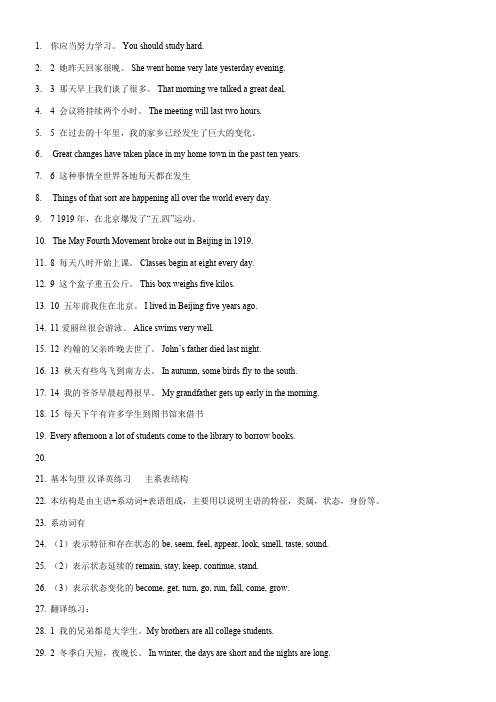
1.你应当努力学习。
You should study hard.2. 2 她昨天回家很晚。
She went home very late yesterday evening.3. 3 那天早上我们谈了很多。
That morning we talked a great deal.4. 4 会议将持续两个小时。
The meeting will last two hours.5. 5 在过去的十年里,我的家乡已经发生了巨大的变化。
6. Great changes have taken place in my home town in the past ten years.7. 6 这种事情全世界各地每天都在发生8. Things of that sort are happening all over the world every day.9.7 1919年,在北京爆发了“五.四”运动。
10. The May Fourth Movement broke out in Beijing in 1919.11.8 每天八时开始上课。
Classes begin at eight every day.12.9 这个盒子重五公斤。
This box weighs five kilos.13.10 五年前我住在北京。
I lived in Beijing five years ago.14.11 爱丽丝很会游泳。
Alice swims very well.15.12 约翰的父亲昨晚去世了。
John’s father died last night.16.13 秋天有些鸟飞到南方去。
In autumn, some birds fly to the south.17.14 我的爷爷早晨起得很早。
My grandfather gets up early in the morning.18.15 每天下午有许多学生到图书馆来借书19.Every afternoon a lot of students come to the library to borrow books.20.21.基本句型汉译英练习主系表结构22.本结构是由主语+系动词+表语组成,主要用以说明主语的特征,类属,状态,身份等。